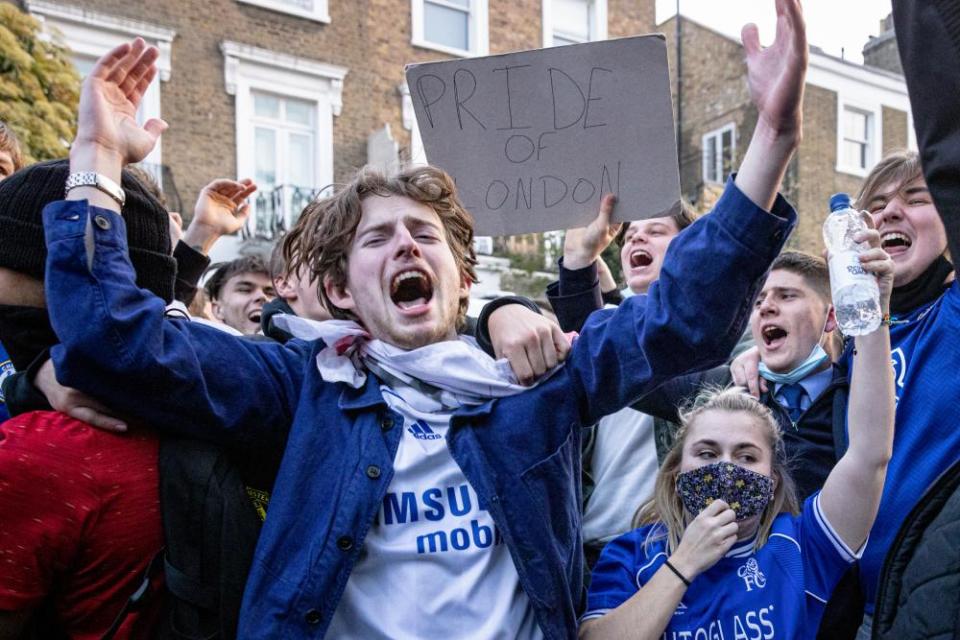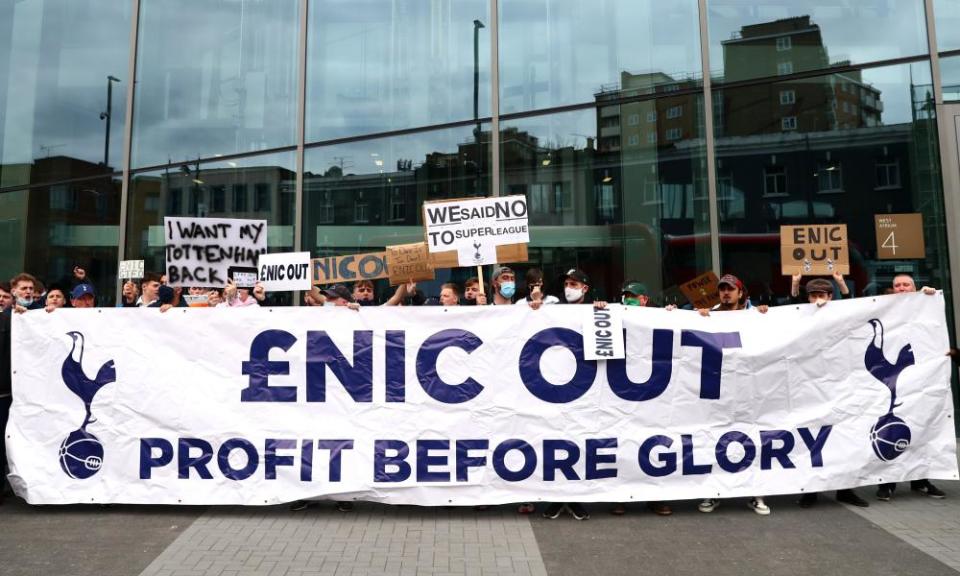ESL fallout: can big six owners regain the trust of their fans?
Arsenal
Although it would be neat and tidy to say this episode has permanently damaged the relationship between Arsenal’s owners and the fanbase, that would assume one existed in the first place. Stan Kroenke’s absence from the spotlight has been a huge bone of contention for years, as has his general running of the club, and supporters have expressed their dissatisfaction at various games in the past. The silence from Kroenke and his son Josh on Arsenal’s planned Super League defection was hardly out of character and it did not go unnoticed that the club’s apology, published on Tuesday night, was signed by “the board” rather than the Kroenkes themselves.
“It puts centre stage again the idea that they must front up,” says Tim Payton, a board member of Arsenal Supporters’ Trust. “I think this week reinforces the view that Kroenke is not a fit owner of Arsenal.”
There is certainly an appetite to turn the heat back up on the owners and that was reflected by the influx of new members – in the late hundreds – who have signed up to the trust since Monday. Many of them are based overseas and the wider show of unity from across the club’s global fanbase has been notable; multiplied by six that has perhaps caught out the breakaway half-dozen, who had priced in a significant level of discontent domestically but were not necessarily prepared for so much anger to rain in from all angles.
Supporters plan to protest outside the Emirates Stadium before the match with Everton on Friday. The #KroenkeOut hashtag has been ubiquitous on social media and fostered by, among others, one of the club’s most famous former players in Ian Wright. Given Arsenal stand a strong chance of missing out on European football altogether for next season the owners were already in line for a summer of unrest and fierce scrutiny; now the temperature has raised immeasurably and they may find it hard to escape. NA
Chelsea

The decision to withdraw from the ESL on Tuesday after vociferous protests before the draw against Brighton may have been the beginning of the end for the breakaway competition but there remains appetite for change at Stamford Bridge among the fans. A statement from the Chelsea Supporters’ Trust on Wednesday described the ESL as “the ultimate betrayal” and called for the chairman, Bruce Buck, and the chief executive, Guy Laurence, to leave after the former “extensively defended CFC’s plan to remain in the Super League at a Fans’ Forum meeting”.
“We request a full and in-depth explanation as to why the board took the decision to turn their back on the European competition and for CFC to explain why they signed up to the ‘Super League’ without prior consultation with their loyal supporters,” it added. “We are disappointed that an apology has not been included in the statement. The legacy of our club was put at risk for what appears to have been solely for financial gain.”
Although Chelsea have privately acknowledged the pivotal role their fans played in persuading the club to withdraw from the ESL, it is understood there is no expectation that Buck, who has been chairman since Roman Abramovich bought the club in 2003, or Laurence will be replaced. The club’s board were believed to have held reservations over joining the breakaway league given Abramovich has always insisted his ownership has never been an attempt to make personal profit and the swift withdrawal may have helped to save some of the goodwill built up over the previous two decades. But the CST is still expected to demand safeguards to ensure there can be no repeat of the past few days. EA
Liverpool
When a comment, and apology, finally came from John W Henry over the Super League fiasco in which he was a prime mover it was littered with the kind of miscalculations that dragged Liverpool into the mess in the first place. The apology from the club’s principal owner was for the “disruption” he had caused. Nothing else. He admitted it had taken 48 hours of furious protest to realise the project lacked the support of fans and therefore “would not stand”. That apparent surprise merely confirmed he has learned nothing of Liverpool fans, or chosen not to, despite 11 years of ownership by Fenway Sports Group and several previous controversies caused by their innate greed. And then there was talk of rebuilding trust and of FSG’s work not being done, as though the entire episode will be forgotten once Jürgen Klopp and the players get back to work. Or until FSG’s next money grab.
Once again Henry has seriously misread the room. FSG’s work at Liverpool may not be done – there is the £60m redevelopment of the Anfield Road stand to complete – but in terms of salvaging whatever trust and credibility they had left with the club’s fanbase, their battered reputation is beyond repair. As the former Liverpool player and now Sky Sports pundit Jamie Carragher put it: “They can’t just leave the club, the business is worth a lot of money, but I don’t see a future for the ownership of FSG at Liverpool on the back of this. This will never be forgotten. I think the best thing for them would be to find a new buyer.”
FSG recently sold a 10% stake in its business to the private investment firm RedBird Capital Partners for £543m but the expansion, and Henry’s video message, will not appease Liverpool supporters’ groups. Spion Kop 1906, when announcing it was reversing the decision to remove flags from the Kop following the club’s withdrawal, stated: “To FSG, your continued wrong decisions and lack of consultation with the fans in these big decisions has been your ultimate downfall.” Joe Blott, chair of Spirit of Shankly, said the apology felt “weasel-word like”, adding: “The only reason they are sorry is because they have been caught out yet again.” AH
Manchester City

Sheikh Mansour can count on a deep bank of goodwill from fans after the success-soaked decade the owner’s £1bn-plus spend has brought. This season City are favourites to win a fifth Premier League title, while Pep Guardiola’s team are in the Champions League semi-final and take on Tottenham in the Carabao Cup final on Sunday.
In being the first to officially declare withdrawal from the ESL City also gained brownie points that may allow a stance which posits they were quickest to listen to supporters and thus truly understood their opposition to the Super League. What City did wisely was follow United, Liverpool and Arsenal in apologising to fans for taking them for granted and the distress caused. This came in a letter from Ferran Soriano, the chief executive, to “Cityzens” on Wednesday and, as with United’s, appealed for forgiveness and expressed “deep regrets” for losing sight of the “historic values of the club”. Soriano also wrote of a wish to “embrace” the chance to win back trust.
City’s continued on-field success plus their community projects that include a considerable redevelopment of the club’s area of east Manchester suggest many Cityzens will soon forget the falsest of moves which was particularly baffling given the slick PR operation headed up by Khaldoon al-Mubarak, the chairman and City’s most powerful executive. And, as with the previous censures handed down by Uefa for financial fair play contraventions and a transfer embargo subsequently overturned by the court for arbitration for sport, supporters may view European football’s governing body as being to blame for provoking the move to join the ESL. JJ
Manchester United
If the Glazers thought they could not become any more unpopular with fans who have detested them since their leveraged purchase loaded eye-watering debt on United it may be time to think again. This is if they care, of course, with all the evidence of their 16-year ownership suggesting ambivalence, at best.
Any attempt then to win round supporters who feel betrayed by the botched sign-up to the ESL may be a non-starter. However commercial imperatives (always of interest to the Glazers) means a push to mend bridges was started via Joel Glazer’s open letter to fans on Wednesday. Yet in claiming “we are sorry” and pledging to being “personally committed to rebuilding trust with our fans” a co-chairman who has not granted an interview since 2005 laid himself open to the charge of this being a cynical move more focused on fans’ pockets than hearts and minds.
To truly walk this talk he or Avram, United’s other executive co-chairman, should take a plane from Florida to Manchester and convene a (socially distant and legal) meeting with supporters, apologise again face-to-face, and take questions. Then, promise to meet them at least once a year and engage with suggestions regarding how they might feel truly connected to the club again.
A second and more material way to convince fans would be to slash the club debt, which stands at £455m, and pledge to bring it down further via regular payments. Doing this would address the prime reason the family attracts such visceral dislike and would be an acknowledgement that such emotion is comprehensible. If both or either of these suggestions read as remote as the Super League ever being popular this is because they are. But beyond this the Glazers have little hope of any kind of warm relationship with United’s support. JJ
Tottenham

The anger within the Tottenham fanbase was well articulated by the Supporters’ Trust, which described the move to follow the money of the Super League as a “betrayal of the club, its history and the magic that makes this game so special”. It said that unless the board withdrew they would demand their removal. Daniel Levy, the chairman, did make the U-turn but the episode has seen his relationship with the fans sink to an all-time low, which is saying something given his 20-year tenure has been characterised by extreme turbulence.
It was no surprise to see #LevyOut trending on Twitter and read comments about the businessman’s readiness to put profit before glory, and there was a small protest before the game on Wednesdayyesterday. But this has always been the thing with Levy, the stick with which to beat him, and it is not as if he has suddenly shown his true colours. Faced with a gaping hole in his accounts because of the pandemic and the likelihood of missing out on Champions League qualification, did anybody truly expect him to walk away from a €3.5bn “golden hello”: and guaranteed elite-level football (and associated revenues) for the rest of his working life? Might that have also appeased Harry Kane, who has said he will consider his future in the summer? To Levy, it must have felt like a silver bullet.
There is no good time for such an unseemly mess but, for Levy, it is hard to see how there could have been a worse one. The team have been in a slump since mid‑December and they now have no permanent manager after the sacking of José Mourinho. The Portuguese felt the squad needed a reboot but with saleable options few (cashing in on Kane would lead to anarchy) and funds tight (as always) is that realistic?
Levy accepted a £175m Bank of England loan at 0.5% last June and there was the furore over his attempt to furlough staff before he bowed to pressure and changed course. The Supporters’ Trust is planning an emergency meeting and its love for the club will endure. Levy must hope better results on the field can be the foundation for gradual reconciliation. DH

 Yahoo Sport
Yahoo Sport 





































